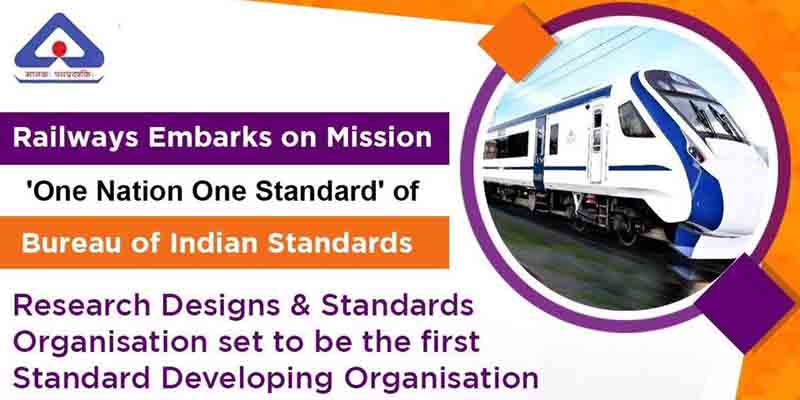- India
- Jun 02
Explainer / The role of RDSO
• Lucknow-based Research Designs and Standards Organisation (RDSO), which sets standards for the railway sector, has become the first standards body in the country to join the central government’s ‘One Nation, One Standard’ scheme that aims to ensure quality products to Indian consumers.
• The RDSO has now been recognised as a Standard Developing Organisation (SDO) by the Bureau of Indian Standards (BIS), which is implementing the scheme.
• The partnership will help RDSO, the sole R&D wing of the railways ministry, to realign its standard formulation procedures as per the code of good practices mentioned under the WTO-Technical Barriers to Trade (WTO-TBT).
• The recognition will be valid for three years.
• RDSO’s partnership with BIS will help harmonise standards for the ease of doing business in the future.
• This partnership will help RDSO to take the opinion of all experts so that time taken in standards making is reduced as well as to have the best quality product at a cheaper cost.
• RDSO has formulated over 1,000 standards for railways and many more are under process.
• The BIS, under the aegis of the consumer affairs ministry, has experience of more than three decades and that will be of help to other standards developing organisations working in specific areas across the country.
• The BIS is making efforts to encourage other standard developing organisations like Directorate of Standardisation under the defence ministry and Directorate of Marketing and Inspection (DMI) under the agriculture ministry to be part of this voluntary scheme.
• The objective of the government’s ‘One Nation, One Standard’ scheme is to ensure there is a synergy and no overlap in the standardisation work in the country, thereby building a ‘Brand India’ identity in the long run.
Research Designs and Standards Organisation
History of RDSO
To enforce standardisation and co-ordination amongst various railway systems, the Indian Railway Conference Association (IRCA) was set up in 1903, which was followed by the Central Standards Office (CSO) in 1930, for preparation of designs, standards and specifications.
However, till Independence, most of the designs and manufacture of railway equipment was entrusted to foreign consultants. Post-Independence and the resultant phenomenal increase in country’s industrial and economic activity, which increased the demand of rail transportation — a new organisation called Railway Testing and Research Centre (RTRC) was setup in 1952 at Lucknow, for testing and conducting applied research for development of railway rolling stock, permanent way, etc.
The Central Standards Office (CSO) and the Railway Testing and Research Centre (RTRC) were integrated into a single unit named Research Designs and Standards Organisation (RDSO) in 1957 at Lucknow under ministry of railways.
RDSO’s major functions involve:
• Development, adoption, absorption of new technology for use on Indian Railways.
• Development of new and improved designs of equipment and systems.
• Setting standards for adoption on Indian Railways.
• Development of specifications for materials and products needed for
Indian Railways.
• Technical investigation, statutory clearances, testing and providing
consultancy services.
• Inspection of critical and safety items of rolling stock (including Metro
Stock), locomotives, signalling & telecommunication equipment and
track components.
• Vendor development for safety and critical items controlled by RDSO.
RDSO also offers international consultancy services in matters pertaining to design, testing and inspection of railway equipments as well as survey for construction of new lines.
Bureau of Indian Standards
• Bureau of Indian Standards (BIS) was established in 1986 assuming the functions of the erstwhile Indian Standards Institution (ISI).
• In its capacity as the National Standards Body of India, BIS is actively involved in matters of international and regional standardisation.
• India has been actively involved in the matters of international standardisation and was one of the founding members of International Organization for Standardization (ISO).
• BIS is a member of the International Electrotechnical Commission (IEC) and regional standards bodies like Pacific Area Standards Congress (PASC) and South Asian Regional Standards Organization (SARSO).
• BIS operates under the framework of the BIS Act of 2016 and the Rules and Regulations framed thereunder.
Objectives of BIS:
• Harmonious development of the activities of standardisation, marking and quality certification of goods.
• Provide thrust to standardisation and quality control for growth, and development of industry on one hand, and to meet the needs of consumers on the other.
• Its headquarters is situated in New Delhi. It has five regional offices located at Kolkata, Chennai, Mumbai, Chandigarh and Delhi. There are 32 branch offices.
• BIS develops Indian Standards through a consultative mechanism in technical committees comprising stakeholders so that views and interests of all are given due consideration while formulating a standard.
• BIS operates a Product Certification Scheme. The presence of Standard Mark (popularly known as ISI mark) on a product indicates its conformity to the relevant Indian Standard. Before granting a licence to any manufacturer, BIS ascertains the availability of required infrastructure and capability of the manufacturer to produce and test the product conforming to the relevant Indian Standard.
Manorama Yearbook app is now available on Google Play Store and iOS App Store


